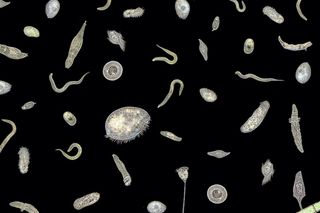
Scientists in Bhopal First to Map Indian Gut Microbiome
The research paves the way for more targeted health treatments.

Scientists at the Indian Institute of Science Education and Research, Bhopal, formed the first holistic picture of the Indian gut microbiome and its genome, based on a study of 110 people from the country’s North-Central and Southern regions. It is the first, critical step in research that could inform the treatment of everything from metabolic to immune disorders.
“The gut microbiome plays a role in everything,” says Vineet Sharma, PhD, who runs the Metagenomics, Bioinformatics and Systems Biology (MetBioSys) lab at IISER Bhopal and who led the research. “When we understand what is actually there in the gut and how diet is promoting the growth of a few microbes, which may or may not be good for health, then we can devise prebiotics or probiotics which can help us restore healthy gut flora.”
The human microbiome is the sum total of diverse bacteria that live on our skin and inside us. The gut microbiome particularly plays a role in nearly every human physiological function, and has been the focus of intense research and, in the West, funding, as it is widely thought to hold the key to managing various diseases and conditions, from diabetes to lupus. Sharma and team’s findings have been uploaded to the Integrated Gene Catalogue, a public database of microbiome genomes mapped by population including Chinese, European, and American gut microbiota gene maps.
Gene catalogues — data that include the genetic codes for each type of bacteria — are helpful in that they allow researchers to identify the types of bacteria present, in what amounts — and crucially, what they do.
Related on The Swaddle:
The Gut Microbiome Differs Between Urban and Rural Populations
“We found genes that play a role in carbohydrate and plant metabolism because of the diet that we have,” Sharma says.
The team found that while the gut microbiome composition differed between North-Central and Southern Indians (the two regions sampled), overwhelmingly both groups possessed much higher concentrations of a bacterium known as Prevotella, compared to microbiomes elsewhere in the world — evidence of diets, even non-veg diets, high in plants and carbohydrates.
“When we took India as a whole and compared to other populations, we found India is very unique,” Sharma says. “We found almost 1 million new genes were there [in the Indian gut microbiome] that were absent from the Integrated Gene Catalogue. That means the Indian gut microbiome is significantly different.”
Sharma calls Prevotella the “key marker species” for the Indian gut microbiome. It is present in particularly high amounts among North-Central Indian microbiota, and is a key regulator of Branched Chain Amino Acids. BCAAs themselves help regulate of blood glucose and diabetes, a finding with implications for more targeted diabetes treatment in a country already known as the diabetes capital of the world.
Related on The Swaddle:
How the Infant Microbiome Shapes Kids’ Long‑Term Health
Which is why Sharma and team are also looking into microbiome metabolism, that is, what Indian gut bacteria does with the food, and especially drugs, we give it.
“We’re seeing that the drugs that are made or clinically tried in the US or West populations, they show lesser efficacy or no efficacy in other populations, sometimes. We have developed an AI-based software of the Indian gut microbiome that can predict whether a population can metabolize a drug or not,” Sharma explains. “If you know this microbe is present in this population that can potentially degrade this drug … [pharma companies] can redesign the molecule such that it remains effective in different populations.” Sharma points to a cardiac medication called Digoxin, which is known to be ineffective in populations with less of a certain kind of gut flora.
The next step toward this, Sharma says, is to confirm what is a healthy versus unhealthy Indian gut microbiome at a population level. His team is currently working to expand the microbial genome mapping to include samples from all geographic areas of India, as well as to map microbial genomes of unhealthy people, like diabetics.
“At present, [we’re] just limited by information,” Sharma says.
Liesl Goecker is The Swaddle's managing editor.
Related


The Anti‑Aging Industry Is Coming For Your Hands
